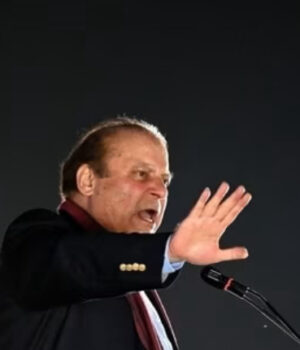In a remarkable homecoming event, Nawaz Sharif, the former Prime Minister of Pakistan, took the opportunity to reflect on the significant achievements of his tenure and revisited a pivotal moment in the nation’s history. During his address, he harkened back to the events of 1998, when Pakistan conducted a series of nuclear tests in response to India’s atomic explosion, defying tremendous international pressure, including a reported offer of USD 5 billion from then-US President Bill Clinton to refrain from such tests.
Nawaz Sharif’s return to Pakistan was marked by a profound sense of nostalgia, as he recounted the pivotal role he played in shaping the nation’s destiny during his tenure as Prime Minister. His leadership, which spanned multiple terms, saw Pakistan through both triumphs and challenges, and he used the occasion to shed light on some of the significant accomplishments of his time in office.
However, one of the most notable and historic chapters in Nawaz Sharif’s tenure was Pakistan’s response to India’s nuclear tests in 1998. At that time, India’s successful atomic tests sent shockwaves through the region and the world. The international community, concerned about a potential arms race in South Asia, engaged in intensive diplomatic efforts to dissuade Pakistan from conducting its own nuclear tests.
One of the most extraordinary revelations during Nawaz Sharif’s address was his account of an offer made by then-US President Bill Clinton. He disclosed that despite immense international pressure, including the tempting offer of USD 5 billion, he made the decision to proceed with Pakistan’s own nuclear tests. This decision, while resolute and momentous, came at a considerable cost, both in terms of geopolitical relations and economic consequences.
Nawaz Sharif’s recollection of this pivotal moment highlights the complex web of diplomacy, geopolitics, and national sovereignty that characterizes nuclear proliferation in an increasingly interconnected world. The decision to conduct the tests was not taken lightly, and it remains a subject of debate and discussion to this day.
Nawaz Sharif’s return and his reflection on his time in power serve as a poignant reminder of the profound impact that leaders can have on their nations, particularly during moments of historical significance. The nuclear tests of 1998, in retrospect, are emblematic of Pakistan’s commitment to safeguarding its national security and its determination to assert its sovereignty in the face of formidable international pressures.
As Nawaz Sharif continues to engage with the public and the political landscape of Pakistan, his story stands as a testament to the complexities and challenges of leadership, as well as the enduring consequences of decisions made in the crucible of history. The echoes of those nuclear tests continue to resonate in the region, reminding us of the delicate balance between global security and national interests.










